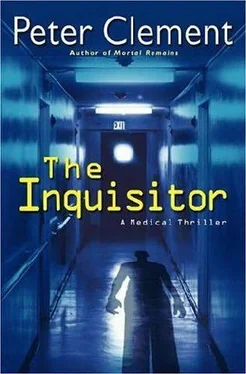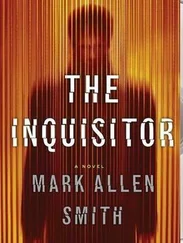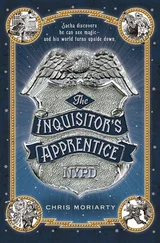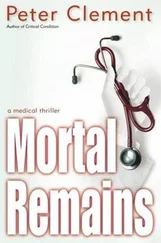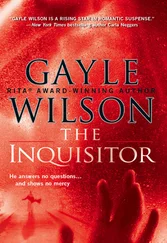Inadvertently Earl did the same.
All clear, apart from J.S.
"There's something you should know about Palliative Care that might help," Thomas said in an only slightly hushed voice. Her presence didn't seem to bother him.
"Oh?"
The resident proceeded to tell him about a pattern, a concentration of codes that occurred on that ward just before dawn.
Earl didn't find it all that surprising. Even on nonterminal floors overnight supervision could be notoriously lax, and patients were occasionally found dead in bed having obviously died hours before. Sometimes it got so bad that residents referred to morning rounds as a body search. He nevertheless thanked Thomas for the information, touched by his concern, and headed downstairs to the pathology department.
He approached the autopsy suite and pushed through a door marked ABSOLUTELY NO ADMITTANCE. The thin, high-pitched whine of a rotary bone saw set his back teeth on edge, and Len Gardner, a man of medium build even when swathed in full protective gear, looked up as the steel blade bit into one of Elizabeth Matthews's ribs. He'd already made a sweeping Y cut of her overlying skin, having sliced it open with a scalpel from beneath her collarbones down the sternum and all the way to her pubis.
"Hi, Earl," he greeted him, as casually as if they were meeting to have lunch. "I thought I'd better do this one myself."
At St. Paul's Len had a reputation as the man who would not be chief. One of the most gifted pathologists in Buffalo, yet having no time for the political niceties that accompanied such appointments, he'd steadfastly refused the honor of heading his department. He also, more than anyone, knew all the dirty secrets about who got it wrong when it came to diagnostic and therapeutic mistakes at St. Paul's. Since Len made it his personal mission to bluntly confront doctors with their errors, Earl suspected he went out of his way to remain unpopular as added insurance against ever getting stuck with an administrative title. Maybe he should have taken Len for a role model. "Thanks. I'm glad you're here," Earl told him, and meant it. Above all, Len would be scrupulously honest.
"My pleasure." He went to work on another rib.
Earl leaned back against the counter where a row of open Tupperware containers half filled with formaldehyde stood ready to receive Elizabeth's major organs. The fumes wafted up his nose, then tingled the back of his throat despite the double mask and a noisy overhead hood designed to suck out such noxious odors. Farther along, racks of test tubes, each one aligned at attention, awaited the more fluid specimens: blood, urine, stomach contents, even her cerebrospinal fluid, the liquid that bathed the brain. These Len would send to the biochemistry lab for a determination of their morphine levels.
Earl turned back to the body and studied Elizabeth Matthews's face. Under the glare of the overhead surgical lamp, it resembled a shiny wax likeness, not flesh at all. He wished he could say she finally looked peaceful, but her features remained taut, accenting the bones beneath, and her mouth, pulled into a grimace, seemed about to emit that thin, piercing cry he couldn't get out of his head.
2:30 p.m.
The nausea hit without warning.
Ripping off her mask, Jane barely made it to the toilet before her stomach muscles started to undulate like a belly dancer's. Her entire lunch hurled into the porcelain bowl as if shot from a fire hose.
She nearly fainted from the force of it, and had to support herself with both hands on the tank.
Then she felt fine.
What the hell? she thought, and waited a few more minutes to be sure.
As she stood there swaying, a crazy, impossible notion crossed her mind.
No, it must have been the tuna salad they'd served in the cafeteria.
She quickly flushed the evidence and returned to the nursing station.
3:35 p.m.
ICU at St. Paul's and casinos had a lot in common, Earl had once joked. Both had no windows, making it impossible to tell night from day. Both had luminescent screens that beeped and flashed fluorescent numbers for winners and losers 24/7. And with both, all results were final.
Carrying a beige folder stuffed with papers, he walked the length of the dimly lit room, past curtained-off cubicles where bags of IV medication and banks of machines kept the hospital's sickest patients from shuffling off this mortal coil. At least that's how it seemed when Stewart ran the show. With his skills he could blur the lines between life and death more than any other intensivist on staff. A few people clucked their tongues and accused him of playing God, but not many. And most of them wouldn't have anyone else if their time to be a guest here turned up.
Earl had recognized Stewart's passion for critical care when they had been residents together at New York City Hospital. Back then Stewart's determination to combine clinical research with practical training showed in his choice of electives. He spent them with a fledgling group of physician-scientists dedicated to evaluating what treatment protocols worked best for an array of life-threatening conditions in ICU. After completing his specialty requirements, he accepted a faculty position at both the hospital and university, eventually becoming director of that same group, only to abandon them a few years later in 1989.
Out of the blue he'd called Earl and asked if there were any openings at St. Paul's. Aware of Stewart's impressive publication record, and having received a stack of sterling recommendations for him from NYCH, Earl pitched him to the credentials committee at St. Paul's. They immediately snapped him up.
But Earl had never fully understood why a man with such a narcissistic appetite to be recognized for his genius would make the jump from the Big Apple to a place like Buffalo.
"Pollution," Stewart had told him at the time.
Earl approached a row of four brightly lit glass chambers that stood along the end wall and instinctively grew wary. They were negative-pressure isolation units, designed to house patients with serious airborne infections. Any time the door opened, air rushed in, the idea being to prevent deadly microbes from floating back into the rest of the hospital where staff and patients could inhale them into their lungs. Up until three months ago, the rooms almost always had a vacancy. Today, every bed held a SARS victim.
He drew closer.
Through the window of the nearest compartment he watched a team of green-clad figures wearing both goggles and full plastic visors. They worked feverishly on a muscular, ebony-skinned man who had fought similar battles shoulder to shoulder with Earl in ER but now struggled for his own life. Teddy Burns had been a respiratory technician at St. Paul's for over twenty years. Just weeks ago the two had joked how neither of them was getting enough sleep, and they'd shared bragging rights over who had the bigger circles under his eyes.
"Too damn proud to let the ship sink- that's us in a nutshell," Teddy had said with a wink, and rushed off.
Now those same dark, deep-set eyes desperately searched the masked faces who towered above him. Teddy's chest heaved as he bucked the tube his rescuers had inserted down his throat to hook him up on a respirator. His gaze found Earl's, and the creases in his face furrowed, angrily funneling in on the outrage that protruded from his mouth, as if ending up like one of his past patients meant the ultimate indignity.
Earl shuddered and placed the palm of his gloved hand against the pane separating them, hoping that Teddy would see it as a gesture of wishing him well.
But Teddy looked away instead, seemingly in disgust that such niceties would be offered in the midst of his agony.
Stewart Deloram, recognizable from the others by black eyebrows that were equally as unruly as his hair and which no protective gear could hide, expertly inserted a clear plastic tube between Teddy's left ribs.
Читать дальше
